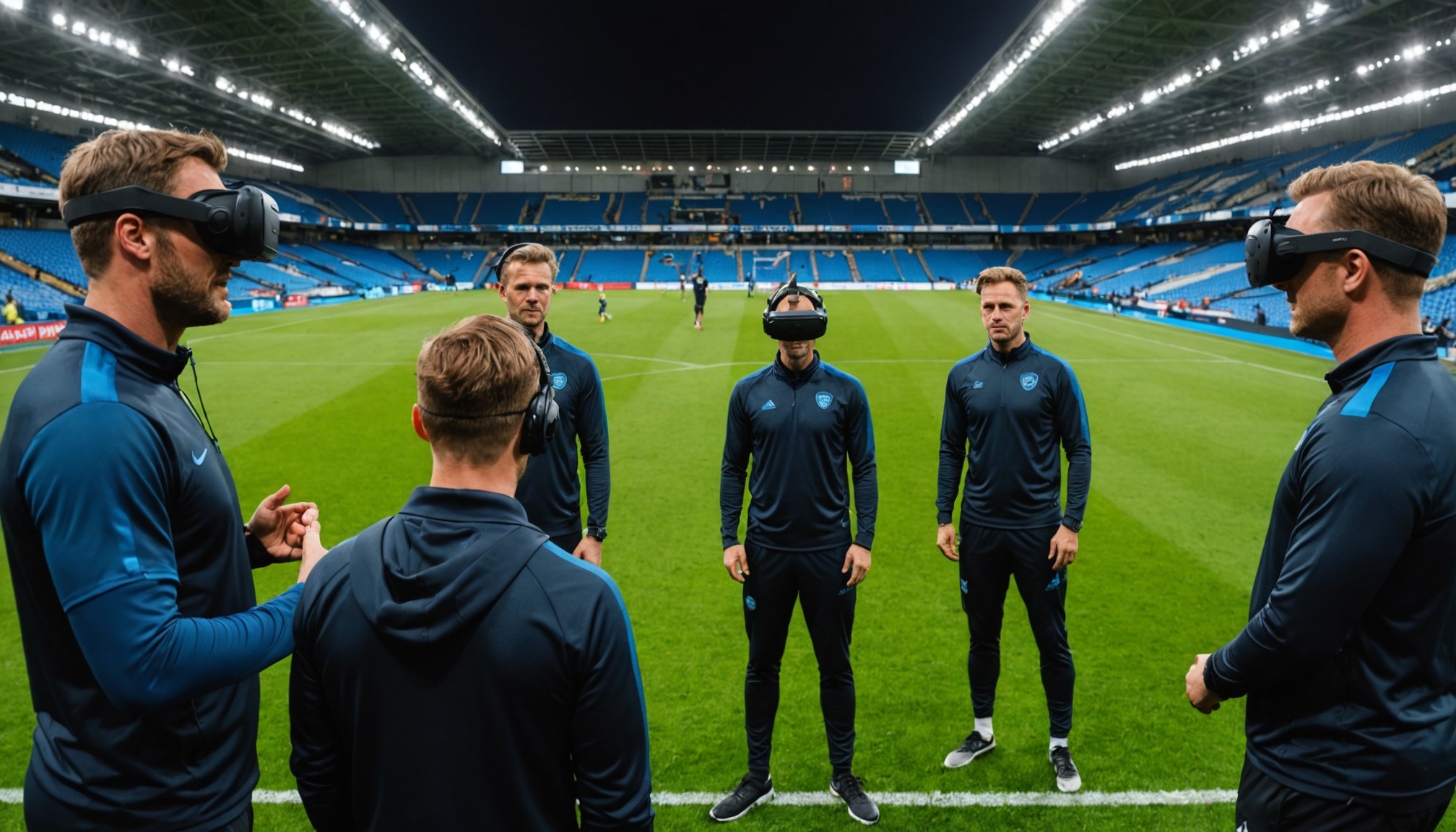Overview of Virtual Reality in Football Coaching
Virtual Reality (VR) is transforming the landscape of sports, especially in football coaching innovations. At its core, virtual reality in sports involves creating simulated environments that mimic real-world scenarios, allowing players to experience game situations without being on the field. This technological advancement is crucial in modern football coaching methodologies, where tactical precision and adaptability are paramount.
Football has utilized VR technology to revolutionize training and performance analysis. Coaches can immerse players in realistic match environments, enhancing their decision-making and strategic understanding. This transition from traditional to virtual methods marks a significant evolution in how teams prepare for competitions.
Also read : Power Play Comeback: Innovative Tactics for UK Football Coaches to Empower Players After Prolonged Injuries
The journey of VR in sports training began with initial trials focusing on its potential to improve player reflexes and situational awareness. Over the years, the adoption of this technology has expanded, capturing the attention of major football clubs looking to gain a competitive edge. As VR becomes more integrated into training routines, its role in developing next-generation coaching strategies is increasingly evident. By employing VR, coaches are not only fostering a more intuitive understanding of the game but also exploring innovative ways to utilize player data and analytics for tailored training sessions.
Key Benefits of VR in Football Coaching
The integration of Virtual Reality in football coaching is opening a new frontier in sports training. One notable advantage is the enhanced tactical understanding it offers players. By simulating real-game scenarios, VR trains athletes to make decisions under pressure, which is critical in high-stakes matches. Players are exposed to a breadth of game situations, honing their abilities to anticipate opponents’ moves and navigate them adeptly.
Topic to read : Reigniting Team Morale: Proven Tactics for Football Coaches to Motivate Players After a Defeat
Moreover, VR provides immersive training environments, enhancing player performance. Its versatility in replicating various conditions means athletes can practice without the physical constraints of traditional methods. This technology creates an adaptive experience, refining player reflexes and strategic thinking in a virtual space that mimics real-life challenges.
Additionally, VR is known for its cost-effectiveness and flexibility, making it an appealing choice for clubs aiming to optimize their training regimens. The ability to train multiple players simultaneously and at various times, without the logistical challenges of scheduling field sessions, adds immense value. Furthermore, extensive sessions and repetition become feasible, allowing for customized, targeted improvement while maintaining the team’s budget.
As VR technology evolves, its benefits will further solidify its role as an essential tool in the dynamic world of football coaching.
Successful Implementations of VR Technology
In recent years, VR technology has shown impressive results in football coaching innovations. Football clubs have adopted VR to streamline training processes, improve player performance, and gain a competitive edge.
Real Madrid’s VR Training Program
Real Madrid has implemented a comprehensive VR training program to enhance player skills and strategy. By simulating in-game situations, the team can focus on precise tactical developments, significantly improving their on-field coordination. To measure success, they analyse player metrics using VR, showing improved spatial awareness and decision-making capabilities.
Liverpool FC’s Tactical Simulation
Liverpool FC’s adoption of VR for tactical simulations provides invaluable insights into game-time dynamics. Their strategic approach helps players experience high-pressure scenarios virtually, which translates into better real-life performance. Data-driven analysis post-training indicates a marked increase in players’ adaptability to different game tactics.
Examples from College Football Programs
Several college football programs are also benefitting from VR. These institutions use VR to create customised training tailored to individual learning styles and requirements. Statistics have shown not only improved performance but also increased player engagement, demonstrating VR’s role as an effective educational tool in sports training.
These successful implementations highlight the profound impact of virtual reality in sports and its role in football’s coaching evolution.
Technological Advancements in VR for Sports
In recent years, VR technology evolution has made remarkable strides in enhancing football training tools. The latest advancements in VR hardware and software are designed specifically for football, providing detailed simulations that mirror real-life game scenarios. Modern headsets, for example, offer heightened realism and intuitive interaction, enabling players to immerse themselves fully in their training exercises.
Artificial intelligence (AI) and machine learning are pivotal in refining VR training experiences. How so? They enhance the adaptability of VR environments, allowing for individualized training regimens based on each player’s performance metrics. AI analyses data in real-time, adjusting simulations to target areas where a player needs improvement, making training both comprehensive and personalized.
Furthermore, the role of data analytics is critical in VR training assessments. Detailed insights from VR sessions help coaches evaluate player progress more accurately. This data-driven approach ensures that coaches make informed decisions, optimizing every aspect of the training process.
As these technologies converge, football coaching evolves into a more precise and effective practice, leveraging the power of data and virtual reality to train athletes in innovative ways. By staying at the forefront of technological advancements, the future of football training becomes brighter and more promising.
Future Trends in VR Football Coaching
The landscape of football coaching is primed for innovations inspired by sports technology. The anticipated influence of 5G on VR applications could be transformative, enhancing speed and connectivity for real-time training sessions. With improved bandwidth, immersive VR experiences without latency will become standard, elevating the quality of coaching and player interaction.
Excitingly, the potential for increased interoperability between devices and platforms is set to enhance coaching methodologies. Imagine seamless integration across gadgets—headsets, wearables, and training software—offering coaches a holistic training environment. This connectivity fosters a comprehensive, cohesive training strategy for teams, improving communication and coordination.
Moreover, the cross-pollination between VR and other fields, such as mental coaching, offers new opportunities for developing players’ resilience and focus. Enhanced simulations foster mental toughness, preparing athletes for high-pressure scenarios.
As these technologies evolve, there are boundless opportunities for youth coaching and grassroots football. Engaging young players with interactive VR experiences makes learning the game enjoyable and effective. However, challenges persist, like cost and accessibility, which must be addressed for widespread VR adoption in training. These innovations promise remarkable advances in both player development and the coaching landscape.
Expert Insights on VR in Football Coaching
The integration of Virtual Reality in Sports has become a pivotal discussion point among experts in the field. Coaches and industry leaders are recognising its potential in refining training methodologies. As one renowned coach noted, the immersive nature of VR creates environments that drastically improve players’ tactical acumen without physical exertion.
Experts emphasise VR’s capability to replicate high-pressure match scenarios, thus enhancing football coaching innovations. This approach allows athletes to practice responses to numerous game situations, fostering better decision-making and situational awareness. Sports psychologists have pointed out the mental benefits, highlighting that consistent VR training can build mental fortitude, crucial for player performance both on and off the field.
Tech experts predict significant advancements in VR technology, suggesting that future developments will further tailor training experiences. AI-driven metrics, for instance, provide insights into an athlete’s strengths and weaknesses, enabling customised training sessions. These insights help coaches make strategic adjustments toward improved team performance.
Interviews with coaches reflect a consensus: the role of VR in sports will only expand, offering transformative training strategies that are more efficient and inherently engaging. The potential of VR technology, while not yet fully unleashed, promises an exciting future for football coaching.




